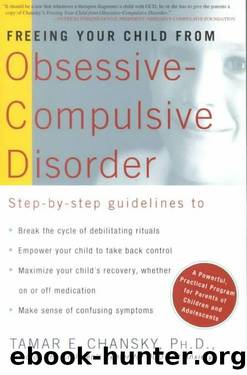Freeing Your Child from Obsessive-Compulsive Disorder by Tamar Chansky

Author:Tamar Chansky [Chansky, Tamar]
Language: eng
Format: epub
ISBN: 9780307794444
Publisher: Potter/Ten Speed/Harmony/Rodale
Published: 2011-06-14T22:00:00+00:00
When you’re trying to help your child change his behavior, it’s important to remain calm, firm, and optimistic. Though anxiety is not your child’s fault, implementing a program for overcoming fears requires a consistent, authoritative stance. Stay calm when your child is upset or frightened, so your child won’t add to his anxiety. Show him you can be afraid yet effective.
Feedback: About Your Child’s Goal
Many parents report that their child gets angry with any kind of praise—he hates it!—and they ask me why. Often kids get angry when they’re praised, but it’s not because of the praise, it’s because they’re being praised for the wrong thing. I learned this lesson from my six-year-old daughter when I asked her to clean up the tornado of toys in her room. After collapsing in a heap and announcing, “It’s too hard!” I narrowed her task to putting the stuffed animals in the toy box. When I returned ten minutes later, I said, “Good, you put the toys away—that’s great.” Taking umbrage with her six-year-old authority, she retorted, “Don’t say good, say thank you.” It hit me in that moment that one problem with praise is that it’s often about what the parents want or what’s meaningful to parents. Haven’t we all experienced this at work? Someone “makes” us do an unwanted task and then when they thank us, we grumble sarcastically under our breath, “yeah, you’re really welcome.” So what I should have said to my daughter is, “I know you didn’t want to do this, but you did. Thanks.” The answer is encouragement and phrasing feedback in terms of the child’s own goal for him or herself.
Psychologist Dr. Carol Dweck, who has researched self-esteem in children, emphasizes praising your child’s efforts rather than the product. She has found that when children are overly praised for simpler achievements, they may not risk going for tougher challenges for fear that they may fail and then not be praised. However, if you are praising their efforts, children will always be motivated to do more.
Download
This site does not store any files on its server. We only index and link to content provided by other sites. Please contact the content providers to delete copyright contents if any and email us, we'll remove relevant links or contents immediately.
Rewire Your Anxious Brain by Catherine M. Pittman(17585)
Talking to Strangers by Malcolm Gladwell(11874)
The Art of Thinking Clearly by Rolf Dobelli(8839)
Mindhunter: Inside the FBI's Elite Serial Crime Unit by John E. Douglas & Mark Olshaker(7833)
Becoming Supernatural by Dr. Joe Dispenza(7102)
Change Your Questions, Change Your Life by Marilee Adams(6639)
Nudge - Improving Decisions about Health, Wealth, and Happiness by Thaler Sunstein(6633)
The Road Less Traveled by M. Scott Peck(6633)
The Lost Art of Listening by Michael P. Nichols(6469)
Enlightenment Now: The Case for Reason, Science, Humanism, and Progress by Steven Pinker(6405)
Win Bigly by Scott Adams(6310)
Mastermind: How to Think Like Sherlock Holmes by Maria Konnikova(6233)
The Way of Zen by Alan W. Watts(5795)
Daring Greatly by Brene Brown(5638)
Grit by Angela Duckworth(4734)
Big Magic: Creative Living Beyond Fear by Elizabeth Gilbert(4723)
Men In Love by Nancy Friday(4319)
Flow by Mihaly Csikszentmihalyi(4050)
The Four Tendencies by Gretchen Rubin(4024)
